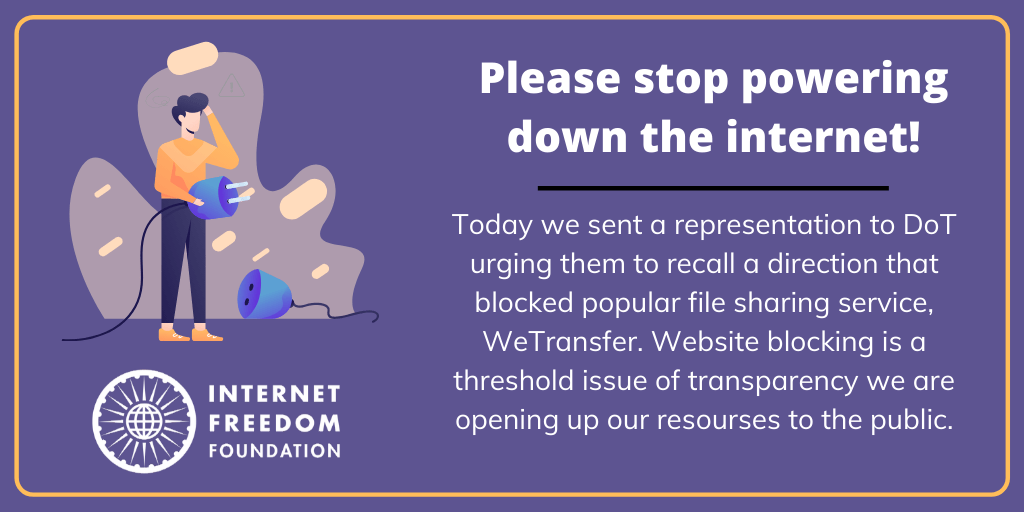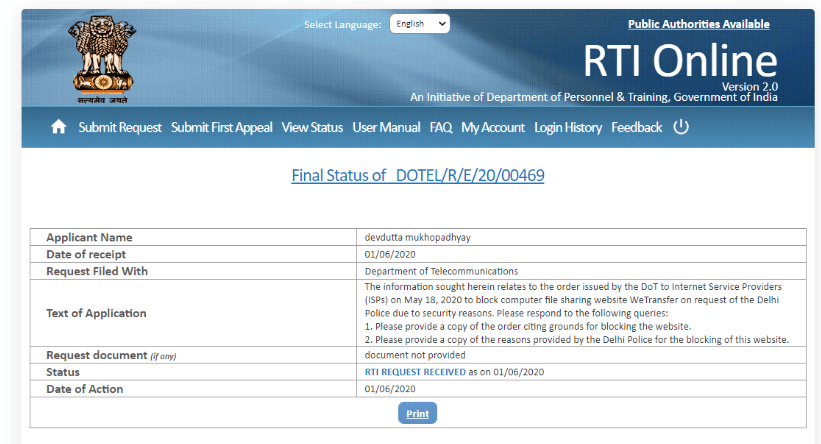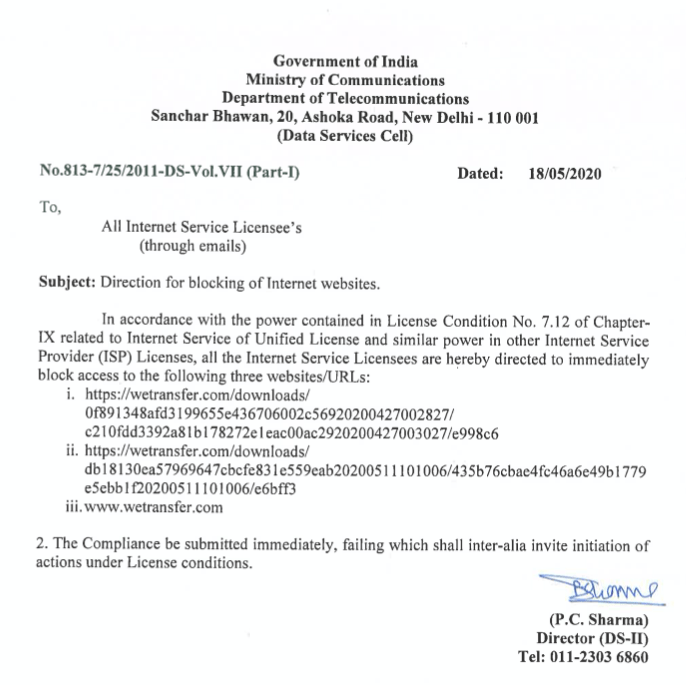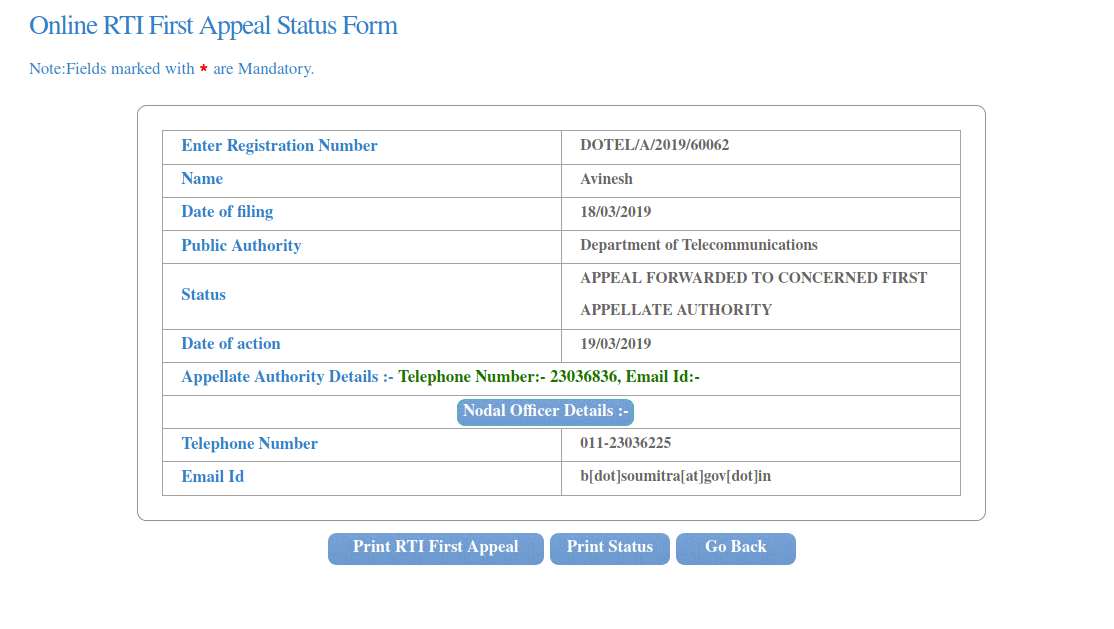
Tl;dr
Popular file-sharing service service, "WeTransfer'' has been blocked by a direction issued by the Department of Telecom (DoT). This has reportedly been done in the interests of, "national security and public order". Today, we sent a representation to DoT urging them to recall this direction. We further also indicate the need for wider regulatory reforms that have led to questionable blocking orders in the past. Including the blocking of Telegram and Porn Websites in India. This is at it's very threshold a transparency problem. To address it we are in addition to the representation opening up our RTI resources to the public to facilitate greater transparency.
WeTransfer blocked
WeTransfer is a popular file sharing service (link) used widely in the creative and legal communities in India for sharing large files. It has even been as late as 2017 been used in press releases on the Press Information Bureau by the Ministry of Defence (link) and the Ministry of Food Processing Industries (link).
Today, we sent a representation to the Department of Telecom to address a direction issued by it to block the popular file sharing web service, “WeTransfer”. This was first reported by Reuters by it’s report dated June 1, 2020, titled, “India asks internet service providers to block WeTransfer” (link). This report was substantiated with several posts on social media by WeTransfer users who further directed us towards a statement by WeTransfer dated on May 27, 2020 (link). To address this specifically, we have taken a range of steps.
When we heard the first press reports on June 1, 2020 itself we filed a RTI.

The second step we have taken is to send a detailed representation to both the Department of Telecom and the Ministry of Electronics and Information Technology (link). But more on that later. Through our active community the actual blocking directions was shared with us susbequently. While we cannot at the moment vouch for its authenticity it seems credible to us. The Order first matches all the data points in news reports (also does not contradict them) and second it is similar to prior blocking directions which we have studied in the past.

Analysis of the WeTransfer Blocking Order
It gets a bit technical here, but please bear with us! A short analysis of this blocking dated May 18, 2020 bearing reference number No. 813-7/25/2011-DS-Vol.VII (Part - I) (“the Order”) reveals the following deficiencies :
- Issues of transparency: As a threshold issue, the Order has not been pro-actively published and hence there exists a large amount of confusion amongst the large base of WeTransfer users in India as the website is being inconsistently blocked across ISPs throughout India. Such publication is a necessity not only as per the inferences which follow from the judgement of Shreya Singhal [link at Para 109], but also the directions made by the Hon’ble Supreme Court in the judgement of Anuradha Bhasin [link at Para 152(a)] made in the context of directions for suspension of telecom and internet services especially for availing judicial remedies.
- Lack of reasoning: The Order does not contain any stated reasons but directs that three URL’s to be blocked. These include two subdomain links which have expired as WeTransfer links for it’s free service makes such links inactive 7 days after creation. The third link is the parent domain of WeTransfer. There is an absence of any reasoning on the material contained on this link or how the service provider itself is in conflict with extant laws and regulations. An absence of any reasoning makes the Order appear mechanical and lacking an application of mind.
- Reliance on UA License: That the Order merely cites License Condition 7.12 in Chapter IX of the Unified License (PDF Link). The License Condition states the following, “7.12 In the interest of national security or public interest, the Licensee shall block Internet sites/Uniform Resource Locators (URLs)/Uniform Resource Identifiers (URIs) and / or individual subscribers, as identified and directed by the Licensor from time to time” . It is relevant to consider that provisions for website blocking are also contained under Section 69 of the Information Technology, 2000 with a defined procedure under the Information Technology (Procedure and Safeguards for Blocking for Access of Information by Public) Rules, 2009 (“Blocking Rules”) (PDF Link). The blocking rules, provide for a detailed process for prior-notice, providing reasons (while they have severe legal deficiencies) provide for a latter, more specific and detailed process of the same power under the grounds of, “national security” and, “public interest” thereby being a more developed regulatory mechanism.
Transparency is a threshold problem : For eg. Telegram
The process of website blocking as noticed in this specific incident is a wider issue that has impacted popular internet based messaging application Telegram.
1/10 Why is the @telegram web domain blocked in India on @reliancejio ? A short thread. Telegram is an internet messaging service which uses end to end encryption. It is used widely in India.
— Internet Freedom Foundation (IFF) (@internetfreedom) February 9, 2019
Working with Avinesh, one of IFF's many community members who first filed the RTI to understand the reason why Telegram's web domain was blocked in India, we had preseed for further transparency by filing a first appeal in March, 2019. Unfortunately the Department of Telecom is yet to respond to her.

Transparency is a real problem.
It undermines the public’s rights to receive information and even contest and approach court to seek restoration. We have also noticed a disturbing trend where that website blocks often emerge from Court Orders that may be premised in directions under Public Interest Litigations and overbroad intellectual property enforcement (top-level analysis of 4000 URLs blocked under court orders link). For instance, court based directions and vague directions by the Department of Telecom have led to the blocking of porn websites which are legal as a private exercise of consumption by Indians (analysis of blocking of porn websites link).
So what is IFF doing to address website blocking of WeTransfer?
We are focussing on the problem of website blocking with a range of advocacy actions which increase chances of reform and success. In addition to creating public literacy materials like this update, and even a video explainer we are first addressing the immediate issue of the blocking of WeTransfer.
Towards this we have sent a representation to the Department of Telecom (link) calling on it to undertake the following steps:
- Recall the Order: Specific to WeTransfer, we urge for the Order to be recalled and if grounds exist then a fresh process may be initiated under the Blocking Rules with proactive public disclosure and an opportunity for WeTransfer representatives to make thier case in defence. Such transparency will further confidence in the exercise of the regulatory power and further provide a right to members of the public to avail judicial remedies given the impact on the fundamental right to receive information.
- Restrict use of, “national security”: Grounds of, “national security” must not be utilised from overzealous Intellectual Property claims. There has been a tremendous growth of court orders that are often passed without adequate public disclosures when users attempt to access such services premised on allegations of infringement. Such claims cater to the private economic interests of large corporations. They are not within the traditional understanding of the security interests of the Government of India and undermine the intent of such power which are to be used solely in the defence of our national interest.
- Start a process for reform: As a solution, we urge for stepping towards institutional reforms, through an interdepartmental consultation that provides for public inputs on the issue of the reform of Website Blocking. This is especially important given such blocking regulations are antiquated, present a threat to not only the fundamental right to receive information (even Network Neutrality protections in the UA License given discretionary blocking by IPS’s), but also causes significant economic impacts for entrepreneurs and users (such as creative professionals who widely use WeTransfer for transferring large file sizes). Further regulatory confusion exists due to overlapping laws which occupy the same field and provide for divergent processes.
How can we address the wider problem of website blocking?
As we have noticed, there is a threshold problem of a lack of transparency in Website Blocking in India.
- A public transparency capacity: Towards this later today, we will be opening up our growing capacity on transparency which is being implemented through RTIs and data side projects (on Section 66A cases and facial recognition deployment). At present this capacity is limited to one staffer and has been privately offered to digital rights researchers. We will outline principles that will help us to strategically offer this resource to maximise impact and supplement research and advocacy by the wider digital rights community in India.
- Strategic litigation: Before parting, we would also like to indicate that IFF through it's team of lawyers and pro-bono counsels is presently conducting a strategic litigation on this very issue in the High Court of Delhi. This is the case of the website blocking of Dowry Calculator where we are representing it's creator Tanul Thakur (link).
Finally, we do not see these actions as adversarial to the Government but with a view towards much needed regulatory reforms. Without prejudice to this litigation, we will continue good faith attempts to engage with all public bodies and government offices!
How can you help? #WeNeed50
We need your help. India needs more champions for it's digital rights.
If you wish to support our work we urge you to donate today. Fund IFF's work consistently by becoming a member today. This month we are running a campaign to enroll 50 of them and allready have been able to sign-up 12. So, please do consider circulating this appeal within your networks.
We can do this together!
Important Links
- Representation to the Department of Telecom dated June 9, 2020 on the blocking of WeTransfer [link]
- Twitter thread on why and how Telegram's webservice has been blocked in India [link]
- Top-level analysis of 4000 URLs blocked under court orders made available under RTI [link]
- Latest updates on the strategic litigation to challenge the website blocking of Dowry Calculator pending before the Hon'ble High Court of Delhi [link]

